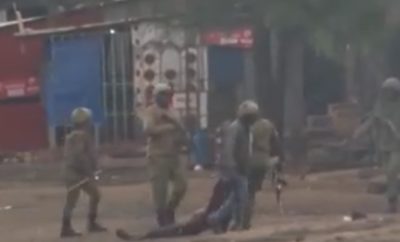Tanzania Political Crisis Leads to Many Deaths
Noriko Watanabe and Kanako Mita
Modern Tokyo Times

Protests erupting from Tanzania’s disputed general election have plunged the nation into turmoil. Streets once bustling with life were choked with smoke and fear, as waves of unrest sweep across cities and towns. Reports of mass killings grow by the day—human rights observers warn that the death toll may have already surpassed 700—painting a picture of a country teetering on the edge of catastrophe.
President Samia Suluhu Hassan, who rose to power in the shadow of her predecessor’s death, has moved decisively to clamp down on dissent. In a sweeping act of control, her government has shut down internet access nationwide, cutting citizens off from the world and silencing the images and videos that laid bare the brutality of the state’s response.
Le Monde reports, “The electoral commission said Hassan won 98% of the vote. The main opposition party, Chadema, which was barred from running, has rejected the results. Election day, despite a heavy security presence, descended into chaos, with Hassan calling for ‘unity and solidarity’ in her inauguration speech.”
Protesters, undeterred by the blackout, accuse Hassan of betraying the democratic ideals she once vowed to uphold—using the full force of the state apparatus not to protect the people, but to silence them. Tanzania, they say, is no longer merely in crisis—it stands at a breaking point.
The BBC reports, “They accuse the government of undermining democracy by suppressing the main opposition leaders – one is in jail and another was excluded on technical grounds – thus bolstering President Samia Suluhu Hassan’s chances of winning with her ruling Chama Cha Mapinduzi (CCM) party.”
Mahmoud Kombo Thabit, Tanzania’s Foreign Minister, has echoed the president’s dismissive stance—portraying the nation’s turmoil as little more than a minor disturbance. Even as reports of mass killings continue to surface, Thabit appeared almost indifferent, insisting with unnerving calm that there were only “a few isolated pockets of incidents here and there,” and that “security forces acted very swiftly and decisively to address the situation.”
His words, delivered with chilling composure, stand in stark contrast to the images of bloodied streets and grieving families—an official denial that feels as deafening as the gunfire that erupted last week.
John Kitoka (Director of Foreign and Diaspora Affairs – Chadema Party) expressed his fear. He pointedly said, “[The security forces] are tracking down all our leaders and some have had to leave the country. These people kill with impunity.”
What began initially as a wave of fury in Dar es Salaam soon exploded to other parts of Tanzania.
The Guardian reports, “The OHCHR said it had received credible reports of deaths in Dar es Salaam, in Shinyanga in the north-west and Morogoro in the east, with security forces firing live ammunition and teargas to disperse protesters.”
Pope Leo XIV said, “I urge everyone to avoid all forms of violence and to pursue the path of dialogue.”
The Tanzanian leadership remains defiant, insisting that the death toll is minimal and dismissing opposition claims of widespread bloodshed. Yet, despite the government’s tight grip on information—and the suffocating silence of an internet blackout—fragments of shocking scenes continue to emerge, hinting at a reality far grimmer than official statements suggest.
Lee Jay Walker (Modern Tokyo Times analyst) says, “For now, the iron-fisted clampdown by state forces appears to have tempered the chaos, but only superficially. Beneath the surface, anger simmers. Tanzania stands at a perilous crossroads: the situation could either spiral into deeper unrest, or the state might succeed—at least temporarily—in crushing dissent through sheer force.”
Either way, without genuine political dialogue with the opposition, President Hassan risks steering the nation toward a future of enduring instability, echoing the turbulence once seen in neighboring Kenya.

Modern Tokyo News is part of the Modern Tokyo Times group
http://moderntokyotimes.com Modern Tokyo Times – International News and Japan News
http://sawakoart.com – Sawako Utsumi’s website and Modern Tokyo Times artist
https://moderntokyonews.com Modern Tokyo News – Tokyo News and International News
PLEASE JOIN ON TWITTER
https://twitter.com/MTT_News Modern Tokyo Times
PLEASE JOIN ON FACEBOOK